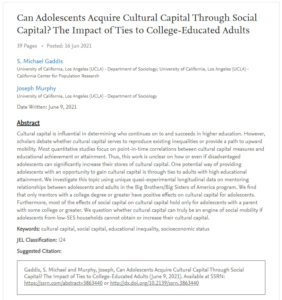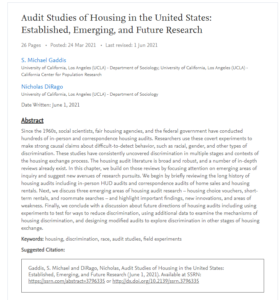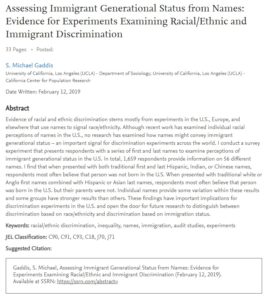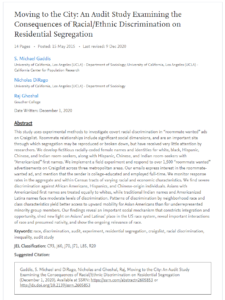Working Paper
Publication Types:
Signaling Class: Two Survey Experiments Examining Social Class Perceptions from Names Used in Racial-Bias Experiments
Abstract
I conduct two survey experiments to examine whether demographic naming patterns predict individual perceptions about the social class of people who have those names. In the primary study, respondents are randomly presented with names and asked to state the social class they associate with each name. In total, 7,697 respondents provide 102,788 social class perceptions on 876 different combinations of first and last names. I use New York State demographic birth record data capturing information on mothers’ race/ethnicity and educational attainment for millions of births in the state over 18 years. I find that the percent of non-White mothers and percent of mothers with a college degree predict respondents’ social class perceptions of names. I find larger differences in social class perceptions among Black rather than White and Hispanic names. This research sheds light on how people perceive characteristics from names and has substantial implications for racial bias research.
Keywords
-
Social class
-
Racial/ethnic discrimination
-
Names
-
Audit Studies
- Experiments
Discrimination Against Black and Hispanic Americans is Highest in Hiring and Housing Contexts: A Meta-Analysis of Correspondence Audits
Abstract
To what extent does racial/ethnic discrimination in America differ across contexts? In this paper, we provide the largest and most comprehensive review of racial/ethnic discrimination research to date. We conducted a meta-analysis of 78 correspondence audits in the United States, representing over half a million applications, emails, and other forms of correspondence that occur in all aspects of modern society, including the hiring, housing, medical, public services, and education sectors. We find that racial/ethnic discrimination in the United States continues to be a large problem, but discrimination against racial/ethnic minorities simultaneously exhibits a substantial amount of contextual heterogeneity not recognized in previous discrimination research. Discrimination against Black Americans is most common in hiring, followed by the rental housing context. Discrimination against Hispanic Americans is highest in hiring, but discrimination in other contexts is considerably lower. Although discrimination occurs in education, medical, and public services contexts, it is far less common in these sectors. Altogether, our findings suggest that discrimination is more common in economic contexts that are more resource-intensive and have higher stakes, despite stronger legal protections against discrimination in those same contexts. Our work confirms that racial/ethnic discrimination in the United States continues to be a persistent and pervasive phenomenon that impacts many core parts of the lives of Black and Hispanic Americans and simultaneously reinforces and exacerbates existing inequalities.
Keywords
- Racial/ethnic discrimination
-
Correspondence audits
-
Field experiments
- Meta-analysis
Changes Over Time in COVID-19 Vaccination Inequalities in Eight Large U.S. Cities
Abstract
We estimate the associations between community socioeconomic composition and changes in COVID-19 vaccination levels in eight large cities at three time points. Between March and April, low SES communities had significantly lower change in percent vaccinated than high SES communities. Between April and May, this difference was not significant. Thus, the large vaccination gap between communities during restricted vaccine eligibility did not narrow when eligibility opened up. The link between COVID-19 vaccination and community disadvantage may lead to a bifurcated recovery where advantaged communities move on from the pandemic more quickly while disadvantaged communities continue to suffer.
Keywords
- COVID-19
-
Neighborhood inequality
-
SES inequality
- Geographic composition
Chinese Americans Faced High Levels of Discrimination in Public Schools Before the COVID-19 Pandemic
Abstract
In the wake of the COVID-19 pandemic, accounts of violence against Asians–and those of Chinese descent especially–have risen dramatically. These disturbing episodes have sparked a rapidly growing research agenda that uses well-controlled research designs to explore the extent, nature, and origins of hostility against Asian Americans in the current moment. Unfortunately, however, researchers undertook few such well-controlled studies examining discrimination against Asian Americans in the years before the COVID-19 pandemic. Thus, scholars have limited experimental evidence upon which to understand and benchmark recent research. We examine data from two large-scale, independently conducted correspondence audits of public school principals before the pandemic. Our research provides clear evidence that discrimination against individuals of Chinese descent in the U.S. is definitively not a new phenomenon driven only by the COVID-19 outbreak. This discrimination is large and widespread in American public schools. Moreover, we find that among public school principals, discrimination against Asian Americans is considerably larger than discrimination against Hispanic and Black Americans. Additionally, discrimination against Asian Americans is larger in areas that have greater shares of White and Republican-voting populations. Our evidence shows that discrimination against Asian Americans is systemically present and does not vary by local mean income or educational attainment. Our two large experiments show that in vitally important contexts, Asian Americans have faced deeply troubling, yet subtle and hard to detect, levels of discrimination that are large by any standard of reference. Discrimination against Asians is an enduring aspect of life in the United States.
Keywords
- Correspondence audits
-
Asian Americans
-
Racial discrimination
- Public schools

Can Adolescents Acquire Cultural Capital Through Social Capital? The Impact of Ties to College-Educated Adults
Abstract
Cultural capital is influential in determining who continues on to and succeeds in higher education. However, scholars debate whether cultural capital serves to reproduce existing inequalities or provide a path to upward mobility. Most quantitative studies focus on point-in-time correlations between cultural capital measures and educational achievement or attainment. Thus, this work is unclear on how or even if disadvantaged adolescents can significantly increase their stores of cultural capital. One potential way of providing adolescents with an opportunity to gain cultural capital is through ties to adults with high educational attainment. We investigate this topic using unique quasi-experimental longitudinal data on mentoring relationships between adolescents and adults in the Big Brothers/Big Sisters of America program. We find that only mentors with a college degree or greater have positive effects on cultural capital for adolescents. Furthermore, most of the effects of social capital on cultural capital hold only for adolescents with a parent with some college or greater. We question whether cultural capital can truly be an engine of social mobility if adolescents from low-SES households cannot obtain or increase their cultural capital.
Keywords
-
Cultural capital
-
Social capital
-
Educational inequality
-
Socioeconomic status (SES)

Audit Studies of Housing Discrimination in the United States: Established, Emerging, and Future Research
Abstract
Since the 1960s, social scientists, fair housing agencies, and the federal government have conducted hundreds of in-person and correspondence housing audits. Researchers use these covert experiments to make strong causal claims about difficult-to-detect behavior, such as racial, gender, and other types of discrimination. These studies have consistently uncovered discrimination in multiple stages and contexts of the housing exchange process. The housing audit literature is broad and robust, and a number of in-depth reviews already exist. In this chapter, we build on those reviews by focusing attention on emerging areas of inquiry and suggest new avenues of research pursuits. We begin by briefly reviewing the long history of housing audits including in-person HUD audits and correspondence audits of home sales and housing rentals. Next, we discuss three emerging areas of housing audit research – housing choice vouchers, short-term rentals, and roommate searches – and highlight important findings, new innovations, and areas of weakness. Finally, we conclude with a discussion about future directions of housing audits including using experiments to test for ways to reduce discrimination, using additional data to examine the mechanisms of housing discrimination, and designing modified audits to explore discrimination in other stages of housing exchange.
Keywords
- Racial/ethnic discrimination
-
Housing inequality
-
Audit Studies
- Experiments
Winmail3: An Automated Email Package with an Application to Correspondence Audit Tests
Abstract
Correspondence audits are a popular method to examine discrimination in a causal framework. However, correspondence audits often require sending hundreds or thousands of emails to subjects. The Winmail3 package allows users to automatically send emails with Stata through PowerShell, which is open-source and cross-platform. Researchers can use this package to perform basic email tasks, such as contacting students or colleagues with standardized messages. Additionally, researchers can perform more complex tasks that entail sending randomized messages with multiple attachments from multiple accounts, tasks that are often necessary to conduct correspondence audit tests. This paper introduces the command and illustrates multiple examples of its application. We believe that researchers can apply this package to correspondence audit tests to save time and money.
Keywords
- Correspondence audits
-
Field experiments
-
Email automation
- Methodology

Assessing Immigrant Generational Status from Names: Evidence for Experiments Examining Racial/Ethnic and Immigrant Discrimination
Abstract
Evidence of racial and ethnic discrimination stems mostly from experiments in the U.S., Europe, and elsewhere that use names to signal race/ethnicity. Although recent work has examined individual racial perceptions of names in the U.S., no research has examined how names might convey immigrant generational status – an important signal for discrimination experiments across the world. I conduct a survey experiment that presents respondents with a series of first and last names to examine perceptions of immigrant generational status in the U.S. In total, 1,659 respondents provide information on 56 different names. I find that when presented with both traditional first and last Hispanic, Indian, or Chinese names, respondents most often believe that person was not born in the U.S. When presented with traditional white or Anglo first names combined with Hispanic or Asian last names, respondents most often believe that person was born in the U.S. but their parents were not. Individual names provide some variation within these results and some groups have stronger results than others. These findings have important implications for discrimination experiments in the U.S. and open the door for future research to distinguish between discrimination based on race/ethnicity and discrimination based on immigration status.
Keywords
-
Immigration
-
Racial/ethnic discrimination
-
Names
-
Audit Studies
- Experiments

Moving to the City: An Audit Study Examining the Consequences of Racial/Ethnic Discrimination on Residential Segregation
Abstract
This study uses experimental methods to investigate covert racial discrimination in “roommate wanted” ads on Craigslist. Roommate relationships include significant social dimensions, and are an important site through which segregation may be reproduced or broken down, but have received very little attention by researchers. We develop fictitious racially-coded female names and identities for white, black, Hispanic, Chinese, and Indian room-seekers, along with Hispanic, Chinese, and Indian room-seekers with “Americanized” first names. We implement a field experiment and respond to over 1,500 “roommate wanted” advertisements on Craigslist across three metropolitan areas. Our emails express interest in the roommate-wanted ad, and mention that the sender is college-educated and employed full-time. We monitor response rates in the aggregate and within Census tracts of varying racial and economic characteristics. We find severe discrimination against African Americans, Hispanics, and Chinese-origin individuals. Asians with Americanized first names are treated equally to whites, while traditional Indian names and Americanized Latina names face moderate levels of discrimination. Patterns of discrimination by neighborhood race and class characteristics yield better access to upward mobility for Asian Americans than for underrepresented minority group members. Our findings reveal an important social mechanism that constricts integration and opportunity, shed new light on Asians’ and Latinas’ place in the US race system, reveal important interactions of race and presumed nativity, and show the ongoing relevance of race.
Keywords
-
Housing
-
Racial/ethnic discrimination
-
Audit studies
-
Experiments
